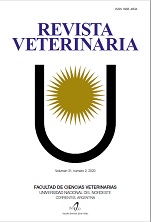Upgrade of the diagnosis and treatment of the canine acute pancreatitis
DOI:
https://doi.org/10.30972/vet.3124749Keywords:
dog, acute pancreatitis, ecography, canine pancreatic lipase immuno-reactivityAbstract
Acute pancreatitis is an inflammatory condition, its causes and pathophysiology are poorly understood. This review focuses on updating the diagnosis and treatment of the disease. In general, premature activation of pan- creatic enzymes leads to the onset of pancreatitis, while the inflammatory response promotes disease progression and systemic complications, it is associated with possible risk factors such as food indiscretions, racial predisposition, and use of certain drugs or concomitant diseases. It usually presents nonspecific clinical signs, so it is important to have an adequate clinical examination and the combination of complementary methods, with ultrasound and canine pancreatic lipase immuno reactivity test being the highly specific methods for the diagnosis of acute pancreatitis. The use of certain serum markers and high-technology equip- ment is very useful in the diagnosis and prognosis of the disease, but its use is variable due to its availability, costs, and the patient’s own conditions. The treatment is mainly based on adequate fluid therapy, proper pain management, antiemetics and nutritional management.Downloads
References
Chang CH, Steiner J. 2016. From diagnosis to treatment. A case of canine acute pancreatitis. Today's Vet Pract 6: 52-59.
Della C. 2015. Pancreatitis canina y felina. Una visión global del diagnóstico de los problemas gastrointestinales en la clínica de pequeños animales. Public FedIberoam Asoc Vet (Quito, Ecuador), 17-26.
Droes F, Tappin S. 2017a. Canine pancreatitis, a challeng- ing disease. Part 1. Companion animal. MA-Healthcare 22: 224-232.
Droes F, Tappin S. 2017b. Canine pancreatitis, a chal- lenging disease. Part 2. Companion animal. MA-Health- care 22: 524-533.
Feijoó SM. 2015. Pancreatitis aguda en el perro. En: Gómez, NV y Feijoó, S: Clínica médica de animales pequeños, 1ra ed., Edit. Eudeba, Buenos Aires, p. 305-310.
French J, Twedt D, Rao S, Marolf A. 2018. Computed tomographic angiography and ultrasonography in the diagnosis and evaluation of acute pancreatitis in dogs. J Vet Intern Med 33: 79-88.
Harris J, Parnell N, Griffith E, Saker K. 2017. Retro- spective evaluation of the impact of early enteral nutrition on clinical outcomes in dogs with pancreatitis (34 cases: 2010-2013). J Vet Emerg & Crit Care 17: 1-9.
Jensen K, Chan D. 2014. Nutritional management of acute pancreatitis in dogs and cats. J Vet Emerg & Crit Care 1: 11.
Lidburym J, Suchodolski J. 2016. New advances in the diagnosis of canine and feline liver and pancreatic disease. The Vet J215: 87-95.
Mansfield C, Beths T. 2015. Management of acute pancreatitis in dogs: a critical appraisal with focus on feeding and analgesia. JSmall Anim Pract 56: 27-39.
Mushtaq S. et al. 2017. Acute pancreatitis in dogs: a re- view. The Pharm Innovat J 6: 509-516.
Okanishi H, Nagata T, Nakane S, Watari T. 2019. Com- parison of initial treatment with and without corticoste- roids for suspected acute pancreatitis in dogs. J Small Anim Pract 60: 1-7.
Pratschke K, Ryan J, McAlinden A, McLauchlan G. 2014. Pancreatic surgical biopsy in 24 dogs and 19 cats: postoperative complications and clinical relevance of his- tological findings. J Small Anim Pract 55: 1-7.
Shmalberg J. 2016. Controversies in the nutritional management of pancreatitis. Today's Vet Pract 6: 45-51.
Tvarijonaviciute A et al. 2015. Serum paraoxonase 1 (PON 1) activity in acute pancreatitis of dogs. J Small Anim Pract 56: 67-71.
Watson P. 2015. Pancreatitis in dogs and cats: definitions and pathophysiology. J Small Anim Pract 56: 3-12.
Wu B et al. 2011. Lactated Ringer's solution reduces sys- temic inflammation compared with saline in patients with acute pancreatitis. Clin Gastroenterol & Hepatology 9: 710-717.
Xenoulis P. 2015. Diagnosis of pancreatitis in dogs and cats. J Small Anim Pract 56: 13-26.
Downloads
Published
How to Cite
Issue
Section
License
Revista Veterinaria (Rev. Vet.) maintains a commitment to the policies of Open Access to scientific information, as it considers that both scientific publications as well as research investigations funded by public resources should circulate freely without restrictions. Revista Veterinaria (Rev. Vet.) ratifies the Open Access model in which scientific publications are made freely available at no cost online.











.jpg)
.jpg)



